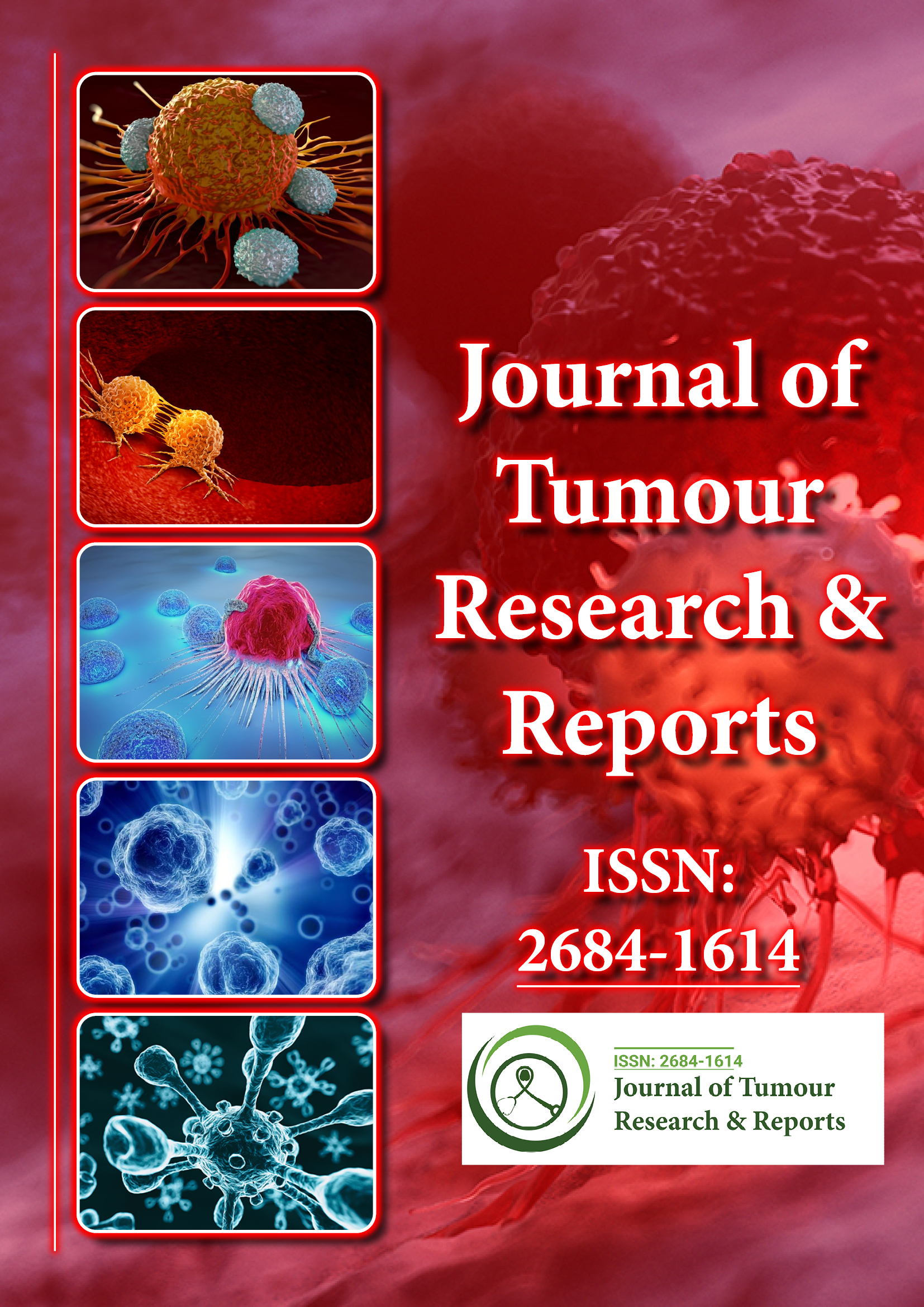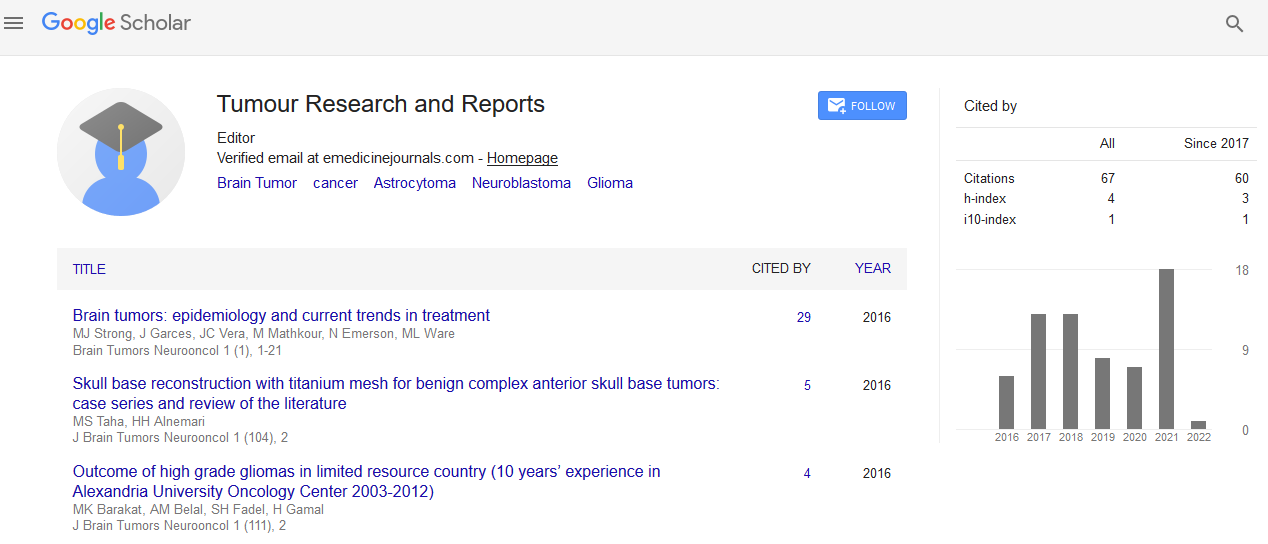Indexed In
- RefSeek
- Hamdard University
- EBSCO A-Z
- Google Scholar
Useful Links
Share This Page
Journal Flyer

Open Access Journals
- Agri and Aquaculture
- Biochemistry
- Bioinformatics & Systems Biology
- Business & Management
- Chemistry
- Clinical Sciences
- Engineering
- Food & Nutrition
- General Science
- Genetics & Molecular Biology
- Immunology & Microbiology
- Medical Sciences
- Neuroscience & Psychology
- Nursing & Health Care
- Pharmaceutical Sciences
Short Communication - (2024) Volume 9, Issue 1
Immune Activation against Cancer: Insights from Vaccine Research
Clouth Oremek*Received: 01-Mar-2024, Manuscript No. JTRR-24-25368; Editor assigned: 04-Mar-2024, Pre QC No. JTRR-24-25368 (PQ); Reviewed: 18-Mar-2024, QC No. JTRR-24-25368; Revised: 25-Mar-2024, Manuscript No. JTRR-24-25368 (R); Published: 01-Apr-2024, DOI: 10.35248/2684-1614.24.9:217
Description
In the field of cancer treatment, immunotherapy has emerged as an innovative approach that control the body's immune system to fight with the cancer cells. Among the diverse arsenal of immunotherapeutic strategies, cancer vaccines stand out as potential tools designed to stimulate the immune system's ability to recognize and destroy cancer cells.
Understanding cancer vaccines
Cancer vaccines, unlike traditional vaccines used for disease prevention, are therapeutic agents designed to target existing cancer cells or prevent cancer recurrence. These vaccines work by stimulating the immune system to recognize and attack against specific antigens expressed by cancer cells [1].
There are two primary types of cancer vaccines
Preventive vaccines: These vaccines are administered to individuals at high risk of developing certain cancers, such as Human Papillomavirus (HPV) vaccines for cervical cancer prevention [2]. Preventive vaccines aim to support the immune system's ability to recognize and eliminate cancer cells before they can establish malignancy.
Therapeutic vaccines: Therapeutic cancer vaccines are designed to treat existing cancer by stimulating the immune system to recognize and attack cancer cells [3]. These vaccines often target tumor-specific antigens, proteins expressed uniquely by cancer cells, to elicit an immune response against the malignancy.
Mechanisms
Cancer vaccines operate through various mechanisms to enhance the body's immune response against cancer:
Antigen presentation: Cancer vaccines deliver specific tumor antigens to Antigen-Presenting Cells (APCs), such as dendritic cells, which process and present these antigens to T cells, a key component of the adaptive immune system [4].
T-Cell activation: Upon encountering tumor antigens presented by APCs, T cells become activated and proliferate, leading to the generation of a robust immune response against cancer cells [5].
Memory formation: Successful vaccination induces the formation of memory T cells, which can recognize and provide a rapid response against cancer cells upon future encounters, providing long-lasting protection against cancer recurrence.
Clinical applications
Cancer vaccines hold significant potential across various cancer types and stages. Some notable clinical applications include:
Prostate cancer: Sipuleucel-T is an FDA-approved therapeutic vaccine for metastatic castration-resistant prostate cancer cancer. It stimulates the patient's immune system to target Prostatic Acid Phosphatase (PAP), a protein expressed in prostate cancer cells [6].
Melanoma: Therapeutic vaccines targeting melanoma-associated antigens have shown efficacy in stimulating immune responses against melanoma cells. Example include Talimogene laherparepvec, an oncolytic virus-based vaccine approved for advanced melanoma treatment [7].
HPV-associated cancers: HPV vaccines prevent HPV infection and reduce the risk of HPV- associated cancers, including cervical, anal, and oropharyngeal cancers. These vaccines target HPV oncogenic strains, preventing viral-induced carcinogenesis.
Personalized vaccines: Advancements in genomic profiling have paved the way for personalized cancer vaccines altered to an individual patient's tumor antigens. This approach, known as neoantigen vaccination, holds potential for improving treatment outcomes by targeting tumor-specific mutations [8].
Challenges and future directions
Despite their potential, cancer vaccines face several challenges that helps in their widespread adoption and efficacy:
Tumor heterogeneity: Cancer cells exhibit significant heterogeneity, both within tumors and among different patients. Developing vaccines that effectively target diverse tumor antigens remains a challenge, particularly in highly mutable cancers.
Immune suppression: Tumors employ various mechanisms to evade immune detection and promote immune suppression, such as upregulation of immune checkpoint proteins like PD-L1. Combining cancer vaccines with immune checkpoint inhibitors may overcome these barriers and enhance therapeutic efficacy [9].
Treatment resistance: Some tumors develop resistance to immunotherapy, limiting the long-term effectiveness of cancer vaccines. Research efforts are focused on understanding the mechanisms underlying treatment resistance and developing strategies to overcome it.
Despite these challenges, ongoing research and clinical trials continue to advance the field of cancer vaccines. Future directions include exploring novel vaccine platforms, optimizing vaccine formulations, and identifying biomarkers to predict patient response [10].
Conclusion
Cancer vaccines represents as a potential in cancer immunotherapy, providing a targeted approach to stimulate the immune system's ability to recognize and eliminate cancer cells. While challenges persist, recent advancements in vaccine design, personalized medicine, and combination therapies holds potential for improving patient outcomes across various cancer types. As research in this field progresses, cancer vaccines prepared to play an increasingly prominent role in the fight against cancer, providing possible effective and personalized treatment strategies.
References
- Lopes A, Vandermeulen G, Préat V. Cancer DNA vaccines: Current preclinical and clinical developments and future perspectives. J Exp Clin. Cancer Res. 2019;38:1-24.
- Kaczmarek M, Poznańska J, Fechner F, Michalska N, Paszkowska S, Napierała A, et al. Cancer vaccine therapeutics: Limitations and effectiveness - A literature review. Cells. 2023;12(17):2159.
- Knolle PA, Huang LR, Kosinska A, Wohlleber D, Protzer U. Improving therapeutic vaccination against hepatitis B - Insights from preclinical models of immune therapy against persistent hepatitis B virus infection. Vaccines. 2021;9(11):1333.
- Davodabadi F, Sarhadi M, Arabpour J, Sargazi S, Rahdar A, Díez-Pascual AM. Breast cancer vaccines: New insights into immunomodulatory and nano-therapeutic approaches. J Control Release. 2022;349:844-875.
- Fan X, Wang K, Lu Q, Lu Y, Sun J. Cell‐based drug delivery systems participate in the cancer immunity cycle for improved cancer immunotherapy. Small. 2023;19(4):2205166.
- Peng L, Fang Z, Renauer PA, McNamara A, Park JJ, Lin Q, et al. Multiplexed LNP-mRNA vaccination against pathogenic coronavirus species. Cell Rep. 2022;40(5).
- Luo L, Luo Z, Wang L, Hu Y, Zhang J, Yin H, et al. Liposome vaccine for active regulation of cellular and humoral immunity. Mol Pharm. 2023;20(11):5668-5681.
- Lim SH, Stuart B, Joseph-Pietras D, Johnson M, Campbell N, Kelly A, et al. Immune responses against SARS-CoV-2 variants after two and three doses of vaccine in B-cell malignancies: UK PROSECO study. Nat Cancer. 2022;3(5):552-564.
- Azar JH, Evans JP, Sikorski MH, Chakravarthy KB, McKenney S, Carmody I, et al. Selective suppression of de novo SARS-CoV-2 vaccine antibody responses in patients with cancer on B cell–targeted therapy. JCI insight. 2023;8(6).
- Wang Y, Zhang Z, Luo J, Han X, Wei Y, Wei X. mRNA vaccine: a potential therapeutic strategy. Mol Cancer. 2021;20(1):33.
Citation: Oremek C (2024) Immune Activation against Cancer: Insights from Vaccine Research. J Tum Res Reports. 9:217.
Copyright: © 2024 Oremek C. This is an open access article distributed under the terms of the Creative Commons Attribution License, which permits unrestricted use, distribution, and reproduction in any medium, provided the original author and source are credited.

